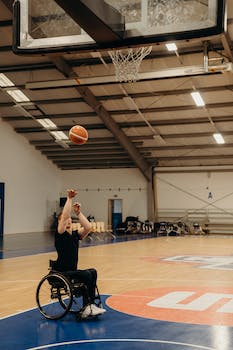
Adaptive Sports: Overcoming Disabilities Through Athletics
Imagine facing physical limitations that make everyday activities a challenge. Now, picture a world where those limitations are not barriers but rather opportunities for empowerment and growth. This is the reality that adaptive sports offer to individuals with disabilities.
The Power of Adaptive Sports
Adaptive sports encompass a diverse range of athletic activities specifically designed for people with disabilities. These sports not only promote physical fitness but also foster a sense of inclusion, self-confidence, and personal development.
One of the main goals of adaptive sports is to break down societal barriers and change negative perceptions surrounding disabilities. Through participation in these sports, individuals can challenge stereotypes and show the world what they are truly capable of.
Types of Adaptive Sports
Adaptive sports cover a wide spectrum, catering to various types of disabilities and individual preferences. Some examples include:
- Wheelchair Basketball
- Adaptive Skiing
- Paralympic Swimming
- Sled Hockey
- Wheelchair Tennis
These sports have their own rules and modifications to accommodate different disabilities, making them accessible and enjoyable for everyone.
Overcoming Barriers
Participating in adaptive sports helps individuals break through physical, emotional, and social barriers. The challenges they face on the field translate into resilience, determination, and an ability to navigate obstacles in their daily lives.
By engaging in adaptive sports, individuals transcending their disabilities and show the world that limitations do not define them. They embrace their unique abilities and channel their focus towards achieving their goals, regardless of the challenges they may encounter.
Health Benefits
Adaptive sports offer numerous health benefits for people with disabilities. Regular physical activity not only improves cardiovascular health but also enhances strength, flexibility, and overall well-being. It can also alleviate stress, boost mental health, and improve self-esteem.
Additionally, participating in adaptive sports can lead to a sense of camaraderie, as individuals connect with others who share similar experiences and challenges. This support network fosters a sense of belonging and allows participants to build lasting friendships.
Beyond the Field
The impact of adaptive sports extends far beyond the field of play. By challenging societal norms and perceptions, these sports contribute to a more inclusive and accepting society. They inspire individuals to recognize the capabilities and potential of people with disabilities.
Moreover, adaptive sports can serve as a stepping stone for individuals to explore new opportunities and overcome barriers in various aspects of life. The skills and mindset developed through these sports can translate into success in education, employment, and personal relationships.
Conclusion
Adaptive sports empower individuals with disabilities, enabling them to transcend their limitations and showcase their abilities. These sports offer physical, emotional, and social benefits, fostering inclusion, self-confidence, and personal growth. By participating in adaptive sports, individuals can break down barriers, challenge societal perceptions, and pave the way for a more inclusive future.